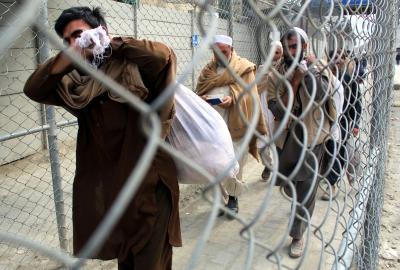Taliban Faces Humanitarian Emergency Compounded By Arrival Of Forcibly Returned Refugees: Report
More than 1400 people were killed while over 3000 were injured while countless families were displaced after earthquake of magnitude 6.0 struck eastern Afghanistan with its epicentre near Jalalabad in Nangarhar province, devastating mountainous terrain and reducing thousands of homes to rubble. Rescue teams have been facing difficulties to reach remote areas near the Pakistan border, where mudbrick homes collapsed on steep slopes, leading Afghan news agency Khaama Press reported on Wednesday.
Health ministry spokesperson Sharafat Zaman said that casualties are expected to increase as rescue teams continue to make efforts to reach cut-off regions. Hospitals and clinics in Afghanistan continue to remain overwhelmed, with hundreds of Afghans already undergoing treatment in hospitals.
"The earthquake struck at a time of deep fragility for Afghanistan, a nation grappling with widespread poverty, prolonged drought, and the legacy of decades of conflict. The Taliban administration, still seeking to consolidate governance since its takeover in 2021, now faces a humanitarian emergency compounded by dwindling international aid and the arrival of large numbers of forcibly returned refugees," the report mentioned.
As Afghanistan continues to face consequences of the earthquake, its burden is compounded by crisis across its border as Pakistan has moved forward with its“Illegal Foreigners Repatriation Plan,” targetting both undocumented Afghans and those with official documentation. Pakistan's decision impacts more than 1.4 million refugees holding UNHCR-issued Proof of Registration (PoR) cards and around 800,000 with Afghan Citizen Cards (ACC). Despite repeated appeals from international agencies, Pakistan has continued to implement its deportation policy.
"A September 1 deadline required PoR card holders to leave voluntarily or face arrest and expulsion. In the days following, thousands of Afghans crossed border points such as Torkham, Chaman, and Spin Boldak. At Torkham alone, over 6,300 individuals with PoR cards returned in a single day, many to homes destroyed by the earthquake or to regions without infrastructure or support. Reports from deportees describe widespread harassment, police raids, extortion, and repeated detentions," the Khaama Press reported.
In cities like Islamabad, it revealed, families fled in groups to avoid separation, with many born and raised in Pakistan now facing an unfamiliar and unstable homeland. Refugees have expressed fear and uncertainty as they return to areas where services are already stretched by disaster recovery efforts.
"Since April 2025, over 362,000 Afghans have returned from Pakistan, including more than 54,000 deportations. Arrests have surged in Balochistan and Punjab, straining both Afghan authorities and international humanitarian organizations. The earthquake has magnified this crisis, leaving many returnees without shelter, livelihoods, or basic assistance," it added.

Legal Disclaimer:
MENAFN provides the
information “as is” without warranty of any kind. We do not accept
any responsibility or liability for the accuracy, content, images,
videos, licenses, completeness, legality, or reliability of the information
contained in this article. If you have any complaints or copyright
issues related to this article, kindly contact the provider above.
Most popular stories
Market Research

- Japan Buy Now Pay Later Market Size To Surpass USD 145.5 Billion By 2033 CAGR Of 22.23%
- BTCC Summer Festival 2025 Unites Japan's Web3 Community
- GCL Subsidiary, 2Game Digital, Partners With Kucoin Pay To Accept Secure Crypto Payments In Real Time
- Smart Indoor Gardens Market Growth: Size, Trends, And Forecast 20252033
- Nutritional Bar Market Size To Expand At A CAGR Of 3.5% During 2025-2033
- Pluscapital Advisor Empowers Traders To Master Global Markets Around The Clock






















Comments
No comment